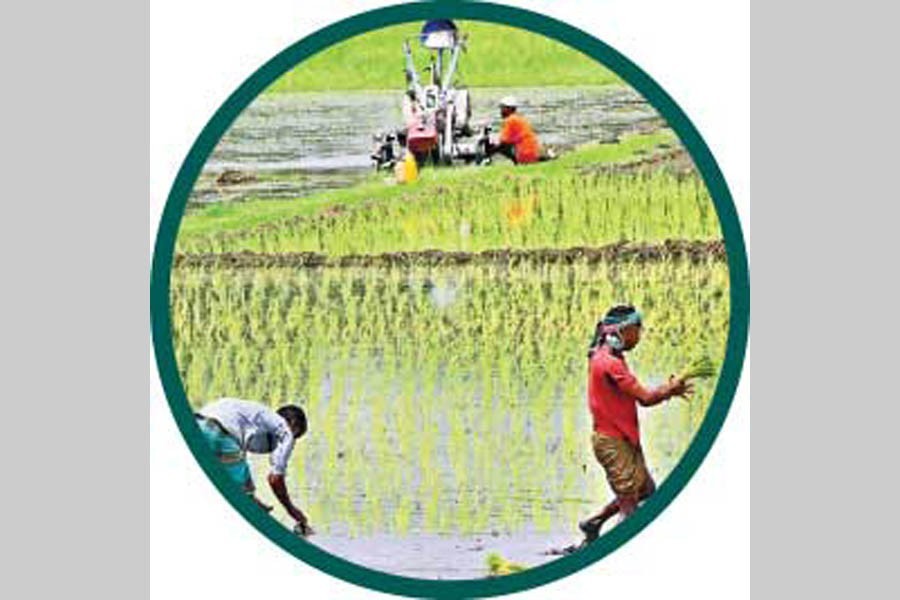What is alarming for Bangladesh is that with the world's highest density of population, the country is fast losing its arable land due to growing industrialisation and rapid encroachment of human habitation on farming areas.
Bangladesh is losing 8,000 hectares of farmland every year from its original 13 million hectares of crop land due to urbanisation, industrialisation, unplanned rural housing and infrastructure buildings. The country's fast growing population is now looking for new land to build homes while entrepreneurs are going to the remote areas of the countryside to set up factories.
Agriculture accounts for only 21 per cent of the country's gross domestic product (GDP) although the sector employs about 47 per cent of the nation's workforce.
There will be no cultivable land left in Bangladesh in 50 years if lands are taken away for non-farm purposes at the current annual rate. If the trend is not reversed now, the country would permanently lose its food security, making its population vulnerable to volatile international commodity prices.
In order to reverse this trend, the government has taken some steps including banning use of arable land for purposes other than agriculture. This is no doubt a laudable step. A high-level committee suggested that the factories and educational institutions that have already been built should now go vertical, instead of grabbing more arable land.
But the government is failing to monitor how much arable land is being transferred for use other than agricultural purposes as it has no adequate manpower to do so.
The dwindling size of farms, rise in landlessness and constant depletion of farmland are posing formidable threats to Bangladesh's agriculture, increasing poverty and trapping many ultra-poor people in a vicious circle. The average farm size has been reduced to less than 0.6 hectares and the percentage of landless people stands at 58 in a country where nearly 80 per cent of the ultra-poor live in rural areas.
It is a matter of great regret that worries about farmland depletion at an alarming rate have fallen into deaf ears, while calls for ensuring optimum utilisation of arable land and bringing fallow land under cultivation remain in rhetoric alone. Successive governments concentrated all their focus on higher production of rice, while import bills for fuel, cooking oils and pulses continued to inflate due to global price volatility in recent years.
A long-pending suggestion to bring slight changes in crop pattern for diversifying agriculture remains unattended by the policymakers.
Rice cultivation covers about 80 per cent of Bangladesh's total cultivated area, though self-sufficiency in food still remains a far cry. Since rice is the staple food and a politically-sensitive product, agricultural policymakers during successive regimes concentrated mostly on rice production and cared little about other major items. Some holistic approaches were planned, but those were never implemented.
An integrated crop management package may be launched by designing agricultural zones based on weather and soil conditions for increasing agricultural production. It is also worrying to find that government expenditure on agricultural research has been steadily declining in Bangladesh.
Analysts say the country could easily utilise regions such as Barind tracts, coastal zone and Sylhet haors to grow more Rabi crops comprising pulses and oil seeds to significantly reduce imports. They suggest an integrated crop management package by designing agricultural zones based on weather and soil conditions for increasing agricultural production. There are a total of 30 agro-ecological zones in the country as defined by experts.
If the use of arable land for non-farming purposes is not restricted immediately, the country will definitely face multiple problems arising out of land scarcity and rising population. These challenges must be addressed with topmost priority.
However, the country's problem of landlessness has emerged as an international issue with the non-functioning of a rule-based global trading regime that has deprived Bangladesh of required support to overcome the nagging domestic problems of food and agriculture.
The World Trade Organisation (WTO) recently referred this critical issue at an international forum, pointing out that in the world's poorest corners, including Bangladesh, land is getting divided through inheritance and farm sizes are getting smaller and smaller with the passing of every generation.
A report titled 'Climate Change as a Security Risk' said that the probable loss of arable and residential lands through flooding in this part of the world (Bangladesh and its neighbourhood) would result in increase of internal and external environmental migration and strained relations between countries. A solution to the issue of farmland depletion could be formulation of a sensible and realistic land-use policy.
It is to be found out why people are becoming landless and how to solve the problem of shrinkage of arable land. Only then necessary measures may be taken. Bangladeshis, on an average, spent 60 per cent of their income on food in the 1990s and that sum has come down to 50 per cent now.
Therefore, keeping the population growth rate under control, proper steps should be taken as early as possible to ensure planned urbanisation in the country. In Bangladesh, the problem of economic development has so far been addressed mainly in isolation from the population issue. But these are actually integral elements of a single strategy and thus need to be treated accordingly.
It is thus expected that the National Population Council will play its due role in controlling population; while strict monitoring and vigilance of RAJUK and all city corporations are a must to stop unplanned development of towns and industries across the country. The nation cannot afford to lose agricultural land any further.


